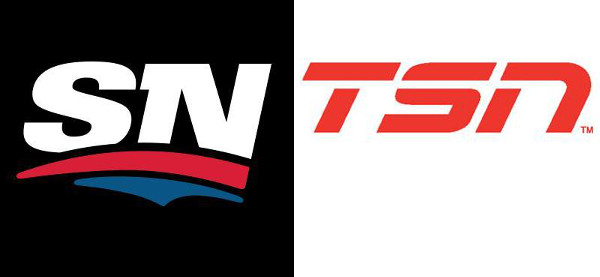4K capabilities are becoming a big push in TV sales (even if they don’t always make a huge difference at this point) and broadcasters are starting to produce content using this new technology. As often seen in the sports media world, too, they’re now arguing about who’s first to embrace it. That’s particularly true in Canada, where rivals Sportsnet and TSN have been battling back and forth over ratings and ratings interpretations for years, and now they’re turning their focus to 4K. Things started with this Sportsnet.ca piece Monday from Luke Fox about Sportsnet’s 4K plans, including Sportsnet picking up a BT Sport 4K NBA feed from London, England last week for “Canada’s initial 4K broadcast” and planning to deliver the NHL’s first 4K broadcast this Saturday. TSN appears to have been not so thrilled with that, sending out a release Wednesday that emphasized that their Wednesday night basketball broadcast would be the first 4K broadcast produced by a North American network, entitled “TSN Produces First-Ever Live 4K Broadcast in North America with Tonight’s Raptors-Celtics Game, Marking Another Historic Milestone for Canada’s Sports Leader“:
After becoming the first sports network in Canada to produce a live sports event in High Definition (HD), tonight’s Toronto Raptors vs. Boston Celtics game marks another historic first for TSN. Tonight’s Raptors game on TSN becomes the first-ever live 4K Ultra HD broadcast produced in North America – one of many broadcasting innovations ushered in by Canada’s Sports Leader.
“Tonight we celebrate another historic milestone in TSN’s rich history,” said Stewart Johnston, President of TSN. “We introduced Canadians to HD in 2003, and we are extremely proud that TSN is the first network to produce a live 4K broadcast in North America, from right here in Canada. Tonight marks just the first of many different sports we’ll showcase in 4K. Beyond basketball and hockey, there’s much more to come.”
“We’ve done extensive testing in preparation for this historic North American production first,” said Mark Milliere, Senior Vice-President of Production, TSN. “With the best broadcast and production teams in Canada at the helm, we are ready to enter the 4K world. And we’re just getting started – we have some awesome 4K content planned in 2016.”
By contrast, Sportsnet has been trumpeting how they grabbed that BT broadcast (a “global first“) and how they’re planning to broadcast 300 hours of live sports in 4K in 2016:
Three hundred of the 500 hours of 4K content Rogers plans to broadcast in 2016 will be live sports, television’s PVR-proof jewel. This includes all 81 Toronto Blue Jays home games and 20 NHL games. Of the eight regular-season NHL contests aired in 4K this season, each one will feature the Leafs and/or the Canadiens. The Senators appear in four.
“Where it will be really spectacular is when sports bars, like [Toronto’s] Real Sports, put in 4K projector sets on their big, big screens. No matter where you’re sitting in the bar, you’ll see spectacular shots,” [Rogers president (Sportsnet and NHL) Scott] Moore says.
First and only are adjectives coveted by individual journalists and national broadcasters alike. So although Rogers has a partnership with the NHL and ownership stakes in the Leafs and Blue Jays, Canada’s initial 4K sports broadcast occurred last week, when Rogers raced quickly to bring early adopters the Raptors-Magic game from London, England.
Both networks are technically right here; Sportsnet showed a 4K broadcast first, TSN produced one first. So, they’re both right to try and trumpet the new technology, and the fight for bragging rights between them might actually lead to further innovation and adoption. Thus, for consumers, it’s not so much about who was first; if both networks jump into this fully, that’s going to produce better results for those who own 4K TVs than if only one did. It’s interesting that both Canadian sports networks are getting into this so heavily, though, as U.S. networks haven’t leapt into 4K anywhere near as much so far. Will 4K wind up being a lasting and widely-adopted broadcasting innovation like HDTV, or a more niche one like 3D broadcasts? We’ll find out, but both Canadian networks seem to be betting on the former…








Comments are closed.